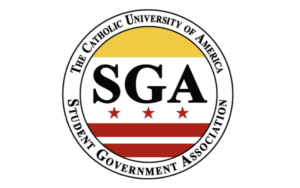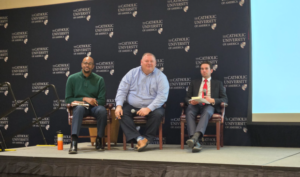Nevada Caucus

Courtesy of NBC News
By Anna Harvey
Against the backdrop of the quickly-approaching Super Tuesday primaries, on February 22 Senator Bernie Sanders claimed a win in the Nevada Democratic caucuses with 46.8% of the vote. Former Vice President Joe Biden took 20.2% of the vote, followed by Mayor Pete Buttigieg with 14.3%, Senator Elizabeth Warren with 9.7%, and Tom Steyer with 4.7%. The Nevada caucuses came shortly after the Nevada Democratic debate on February 19, in which Sanders, Warren, Buttigieg, and Biden primarily dominated the debate stage. Mayor Mike Bloomberg also took significant hits from the other candidates on his recently-begun campaigning for the Democratic Party.
The Nevada caucuses also come after the confusion of Iowa caucuses, in which a smartphone app designed to track precinct results failed due to partial data-collecting, and a backup plan of phoning in results likewise failed. Differing from the Iowa caucuses, the Nevada caucuses did not use an app to report results, but rather gave caucus volunteers the option to report results through traditional methods, such as by phone only or on paper. Additionally, according to NPR, the Democratic leaders planned to use a customized set of Google forms accessed through iPads. Despite these measures, however, similar to Iowa, there was a delay and confusion in reporting the results, and several Democratic leaders now call to amend Nevada’s caucus system and change it to a primary system.
The Nevada caucuses were particularly unique in that they had a more diverse voter turnout than any presidential contest this year. Out of this turnout, according to BBC, Sanders won 53% of the Hispanic vote, based on entrance poll data. Further entrance poll data indicated that Sanders additionally won two-thirds of voters aged 17 to 29. For African American voters, however, entrance poll results indicate that Biden took 36%, as opposed to Sanders with 27%.
This theme of Biden leading with African American voters may likewise play out during the South Carolina primary, which is to take place on February 29.
“It will be interesting, because we’ve seen in the past that in my state, Joe Biden has been particularly popular, particularly with the African American community,”Grace Riordan, a member of the College Democrats and a native of South Carolina said.
“I am a moderate Democrat, so I am disappointed in the support that Bernie received in caucuses,”said Riordan.
Given that Sander’s large win amongst the Nevada voters, Grace reflected on how the remaining candidates lacked the percentages to give them a boost among voters in South Carolina, as well as other states participating on Super Tuesday.
Additionally, as President of the College Democrats, Thomas Gambino identified problems of potential reform within the Nevada caucuses.
“I think they are disorganized, undemocratic, and they just do not work, and they are not reflective of the party that they are trying to get a nominee for,” said Gambino.
Looking past the Nevada caucuses, Gambino also offered insights on the upcoming South Carolina primary and Super Tuesday.
“It was a pretty clear win for Bernie Sanders, as the front runner going into Super Tuesday, which was, in addition to South Carolina, supposed to cement the nomination for Joe Biden, but that does not look to be the case anymore,” said Gambino.
For Sanders, this win in Nevada, coupled with his win in the New Hampshire primary and his second-place success in Iowa, could give him a boost in South Carolina and on Super Tuesday. Following the South Carolina debate on February 25, however, in which the candidates clearly indicated a hesitation with having Sanders as a Democratic-Socialist on the Democratic ticket, Super Tuesday and South Carolina voters could potentially reverse Sanders’ winning streak from Iowa, New Hampshire, and Nevada.








